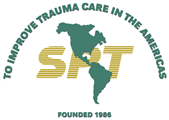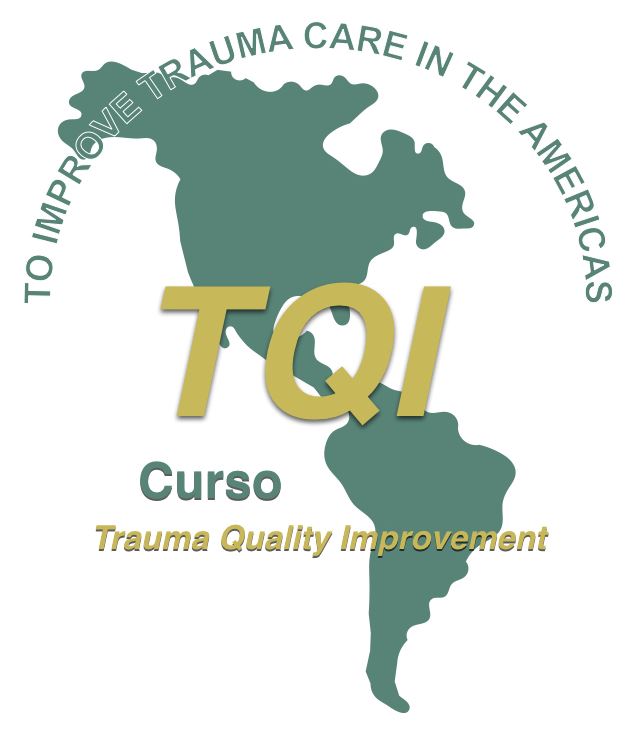

PANAMERICAN TRAUMA SOCIETY
SOCIEDAD PANAMERICANA de TRAUMA
Trauma Quality Improvement (QI)
 Description: This 2–3 day course is one of several courses on injury control topics that have been developed by the Department of Violence and Injury Prevention and Disability at the World Health Organization (WHO).
Description: This 2–3 day course is one of several courses on injury control topics that have been developed by the Department of Violence and Injury Prevention and Disability at the World Health Organization (WHO).
A key administrative function used to strengthen trauma care is the quality improvement (QI) programme, also known as quality assurance, medical audit, or continuous quality improvement. QI programs have been shown to be important components of the functioning of trauma centres and trauma systems in high-income countries. They have also shown promise as means to lower trauma mortality, at an affordable cost and in a sustainable fashion, in the setting of low- and middle-income countries (LMICs). However, evaluations carried out as part of WHO’s Essential Trauma Care Project have shown that few trauma-related QI programs are in place in LMICs.
This course thus seeks to meet this need and to provide participants with a working knowledge of trauma QI programs, oriented for the real world circumstances, especially those prevalent in LMICs.
General Objective: This course seeks to promote better understanding of the field of QI; to provide training on straightforward and practical techniques, such as preventable death reviews; and to discuss with participants ideas on future development of trauma QI and related training.
Specific Objectives:
- Gain an understanding of the field of trauma QI and how it has been implemented in different countries globally, and gain an understanding of the potential benefits of trauma QI programmes in terms of improved process and quality of care and decreased rates of complications, morbidity, and mortality. This includes gaining a familiarity with the evidence base supporting these benefits.
- Gain an understanding of the different options available for implementing trauma QI programmes in different size hospitals and different environments globally.
- Become acquainted with the most widely applicable forms of trauma QI, including morbidity and mortality reviews (M & M conferences) and preventable death panel reviews.
- Be able to improve the methodology and utility of existing M & M conferences in hospitals of any size, especially in terms of using findings from the conferences to implement corrective action on problems identified.
- Be able to set up, conduct, and follow through on the findings of preventable death panel reviews, whether for a single institution or a wider area.
- Gain an understanding of the more complex methods of trauma QI (including use of audit filters and statistical methods of risk adjustment) and be able to utilize these in circumstances where they are warranted.
- Be able to implement targeted corrective action to address problems identified by any type of QI process, including “closing the loop” to prove that problems have indeed been corrected.
Target Audience (who should attend): Trauma Surgeons, General Surgeons, Orthopedic Surgeons, Neurosurgeons, Emergency Physicians, Intensivists, Anesthesiologists, EMS Providers (senior EMS leaders), Nurse EMS providers (senior EMS leaders), Health Administrators, Public Health Workers (those working in ministries of health or state health departments who have duties related to administration or planning of trauma care services), & Other (Mass casualty management/disaster planning staff).
Course Agenda:
DAY 1
TIME ACTIVITY 8:30-9:00 am Registration
9:00-9:50 Welcome, Overview of Course & Pre-Course Survey
9:50-10:40 Module 1: General Intro to Quality Improvement Programs
Presentation 1: Basics of Trauma QI: Definition and Concepts
10:40-11:00 Coffee & Tea Break
11:00-11:50 Module 2: Benefits of Quality Improvement Programs
Presentation 2: Benefits of Trauma QI Activities
12:00-1:00 pm Lunch Break
1:00-1:50 Module 3: Intro to M&M conferences
Presentation 3: M&M Conferences
1:50-2:40 Module 4: Introduction to Preventable Death Reviews
Presentation 4: Preventable Death Panel Reviews
2:40-3:00 Coffee & Tea Break
3:00-3:50 Practice with M&M conferences and preventable death panel reviews (large group)
4:00-4:50 Practice with M&M conferences and preventable death panel reviews (small group)
5:00-5:30 Wrap-up Day 1
DAY 2
TIME ACTIVITY 8:30-9:00 am Review of Day 1, Overview of Day 1
9:00-9:50 Module 5: Introduction to Advance Techniques
Presentation 5: Advanced Techniques
9:50-10:40 Module 6: Corrective Strategies & Closing the Loop: Making Improvements Happen
Presentation 6: Corrective Strategies
10:40-11:00 Coffee & Tea Break
11:00-11:50 Practice with Corrective Strategies
12:00-1:00pm Lunch Break
1:00-1:50 Module 7: Importance of Data, Role of Medical Records
Presentation 7: Importance of Data, Role of Medical Records
1:50-2:40 Coffee & Tea Break
2:40-3:00 Module 8: Role of QI in Different Types of Institutions: Open Discussion of Potential Utility of Trauma QI to home institutions & Countries of Course Participants
Presentation 8: Role of QI in Different Types of Institutions
3:00-3:50 Practice with Role of QI in Different Types of Institutions (review case studies
4:00-4:50 Wrap-up & Post-Course Evaluation
Manual available in the following languages: English & Spanish. The book for the course is: Guidelines for Trauma Quality Improvement Programmes (WHO, Geneva, 2009), and is available for download here.
Pre-Test & Post-Test: Onsite Administration
Evaluation Form: Onsite Administration
Certificate: Onsite Administration (if paid pre-course) or E-mail Administration (if paid post-course)
Course Duration: 2 days
Course Director & Faculty: Course Directors and faculty must be experts in the field of Trauma and disaster. The Director and Faculty can be International or Local experts. All course directors and faculty must be pre-approved. Please contact Dr. Charles Mock, cmock@uw.edu for a list of pre-approved directors and faculty.
Local Coordinator: Each course will be assigned a coordinator. The Course Coordinator can be local or International
Number of Participants: Ratio of instructors to students 1:6